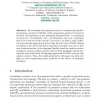Free Online Productivity Tools
i2Speak
i2Symbol
i2OCR
iTex2Img
iWeb2Print
iWeb2Shot
i2Type
iPdf2Split
iPdf2Merge
i2Bopomofo
i2Arabic
i2Style
i2Image
i2PDF
iLatex2Rtf
Sci2ools
DLT
2004
2004
On Competence in CD Grammar Systems
Abstract. We investigate the generative power of cooperating distributed grammar systems (CDGSs), if the cooperation protocol is based on the level of competence on the underlying sentential form. A component is said to be =k-competent (k-, k-competent, resp.) on a sentential form if it is able to rewrite exactly k (at most k, at least k, resp.) different nonterminals appearing in that string. In most cases CDGSs working according to the above described cooperation strategy turn out to give new characterizations of the language families based on random context conditions, namely random context (context-free) languages and the biologically motivated family of languages generated by ET0L systems with random context. Thus, the results presented in this paper can shed new light on some longstanding open problems in the theory of regulated rewriting.
Related Content
| Added | 30 Oct 2010 |
| Updated | 30 Oct 2010 |
| Type | Conference |
| Year | 2004 |
| Where | DLT |
| Authors | Maurice H. ter Beek, Erzsébet Csuhaj-Varjú, Markus Holzer, György Vaszil |
Comments (0)

